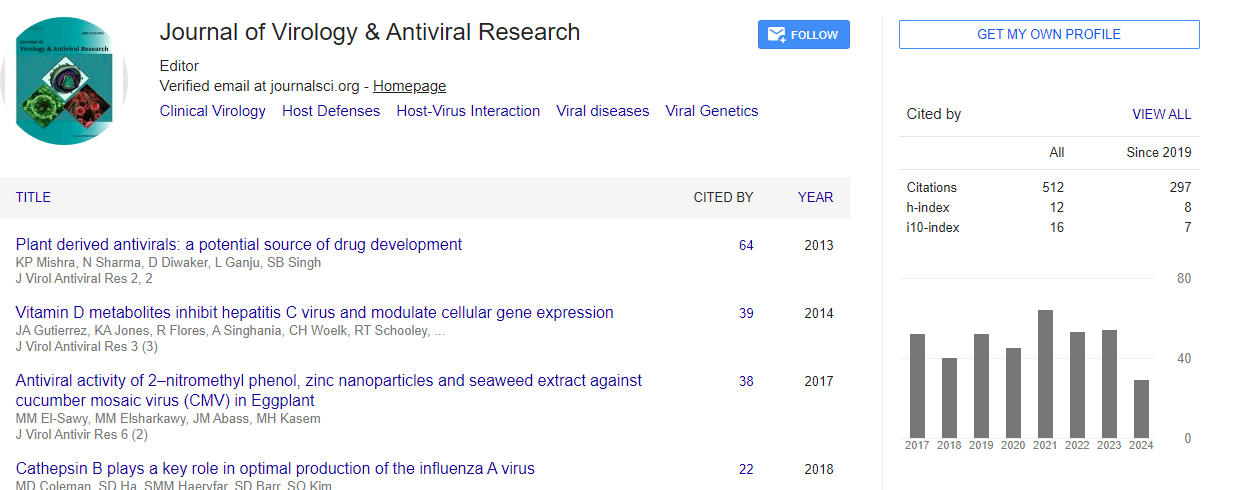Opinion Article, J Virol Antivir Vol: 12 Issue: 2
Broad-Spectrum Antivirals: Paving the Way for Pandemic Preparedness
Mathieu Tropsha*
1Department of Biochemistry, Microbiology and Immunology, University of Ottawa, Ottawa, Canada
*Corresponding Author: Mathieu Tropsha,
Department of Biochemistry,
Microbiology and Immunology, University of Ottawa, Ottawa, Canada
E-mail: tropmath90@ohri.ca
Received date: 29 May, 2023, Manuscript No. JVA-23-107833;
Editor assigned date: 31 May, 2023, PreQC No. JVA-23-107833 (PQ);
Reviewed date: 15 June, 2023, QC No. JVA-23-107833;
Revised date: 22 June, 2023, Manuscript No. JVA-23-107833 (R);
Published date: 29 June, 2023, DOI: 10.4172/2324-8955.1000674
Citation: Tropsha M (2023) Broad-Spectrum Antivirals: Paving the Way for Pandemic Preparedness. J Virol Antivir Res 12:1.
Abstract
Description
The ongoing COVID-19 pandemic has underscored the urgent need for effective antiviral therapies capable of combating a wide range of viral infections. Broad-spectrum antivirals, a class of drugs with the potential to target multiple viruses, offer a promising solution to this global challenge. By disrupting essential viral processes shared among different viral families, these antivirals hold the potential to treat not only current and emerging viral outbreaks but also future unknown viral threats. In this article, we delve into the groundbreaking research and development of broad-spectrum antivirals, highlighting their mechanisms of action, potential applications, and the critical role they play in pandemic preparedness and public health.
Understanding broad-spectrum antivirals
Broad-spectrum antivirals are a class of therapeutic agents that target conserved viral components and processes common to multiple viruses. Unlike traditional antiviral drugs that specifically target a single virus or viral family, broad-spectrum antivirals aim to tackle a wide range of viral pathogens. One of the key targets for broadspectrum antivirals is viral replication, which is a fundamental process shared by all viruses. By inhibiting viral replication, these antivirals effectively hinder the spread of viral infections and reduce the viral load in infected individuals. Additionally, some broad-spectrum antivirals focus on targeting host cell factors that are essential for viral replication, as these factors may be conserved across multiple viruses. By interfering with host-virus interactions, these antivirals can effectively disrupt viral replication and limit viral spread.
Mechanisms of broad-spectrum antivirals
Broad-spectrum antivirals employ diverse mechanisms to combat viral infections effectively.
Viral polymerase inhibition: Many broad-spectrum antivirals target viral polymerases, enzymes essential for viral replication. These drugs interfere with viral RNA or DNA synthesis, preventing the production of infectious viral particles.
Protease inhibition: Proteases play a significant role in viral maturation and particle assembly. By inhibiting viral proteases, broadspectrum antivirals prevent the formation of infectious viral particles.
Host cell factor targeting: Certain broad-spectrum antivirals focus on host cell factors that are critical for viral replication. By targeting these host factors, these antivirals disrupt the replication cycle of multiple viruses.
Immune modulation: Some broad-spectrum antivirals modulate the host immune response to enhance antiviral defense mechanisms. These drugs can boost the immune system's ability to combat various viral infections.
Applications in pandemic preparedness
The emergence of novel and highly pathogenic viruses, such as SARS-CoV-2 and the Ebola virus, has highlighted the importance of having effective antiviral treatments ready for use during pandemics. Broad-spectrum antivirals have the potential to fill this critical gap in pandemic preparedness. Traditional drug development can be timeconsuming and resource-intensive. Broad-spectrum antivirals that target conserved viral processes can be developed more rapidly and may be effective against multiple viral pathogens, enabling a quicker response to emerging outbreaks.
In the face of a new and unknown viral threat, broad-spectrum antivirals can be a valuable tool in providing initial treatment options until specific antiviral therapies are developed. The use of broad-spectrum antivirals may reduce the emergence of drugresistant viral strains, as these drugs target conserved viral components that are less prone to mutation. Broad-spectrum antivirals can help ease the burden on healthcare systems during pandemics by offering a versatile treatment option applicable to multiple viral infections, reducing the need for multiple specific antiviral treatments.
Examples of broad-spectrum antiviral candidates
Remdesivir: Originally developed to treat Ebola, remdesivir has demonstrated broad-spectrum activity against various RNA viruses, including coronaviruses, filoviruses, and paramyxoviruses. It has been authorized for emergency use in treating COVID-19.
Favipiravir: Originally developed as an anti-influenza drug, Favipiravir has shown broad-spectrum activity against multiple RNA viruses, including coronaviruses and arenaviruses. It is being evaluated for its effectiveness against COVID-19.
Ribavirin: Ribavirin exhibits antiviral activity against a wide range of RNA and DNA viruses, including Respiratory Syncytial Virus (RSV), Hepatitis C Virus (HCV), and flaviviruses. It is a broadspectrum antiviral with applications in treating various viral infections.
Sofosbuvir: Originally developed to treat HCV, Sofosbuvir is a nucleotide analogue with broad-spectrum antiviral activity against several RNA viruses, including coronaviruses. It has shown potential as a candidate for treating COVID-19.
Conclusion
Broad-spectrum antivirals represent a promising approach to combat a wide range of viral infections, including emerging and pandemic viruses. By targeting conserved viral processes and host cell factors, these drugs offer versatility, rapid response capabilities, and the potential to mitigate viral spread during outbreaks. The ongoing research and development of broad-spectrum antivirals are critical in strengthening pandemic preparedness and public health resilience. Collaborative efforts between researchers, pharmaceutical companies, and public health agencies are essential to accelerate the discovery and approval of these life-saving treatments. As we navigate the challenges of emerging viral threats, broad-spectrum antivirals hold the key to a more resilient and prepared global health community.
 Spanish
Spanish  Chinese
Chinese  Russian
Russian  German
German  French
French  Japanese
Japanese  Portuguese
Portuguese  Hindi
Hindi 

